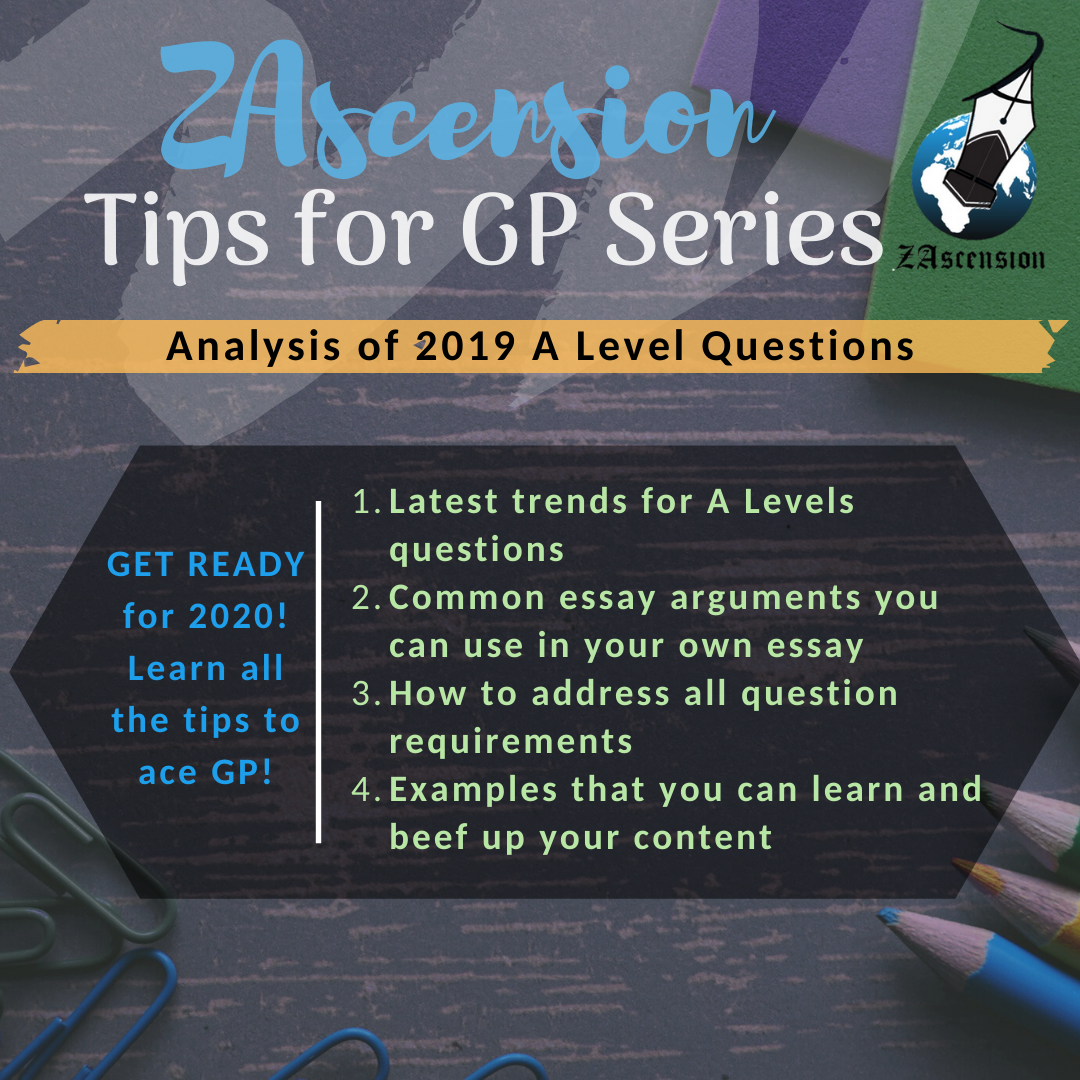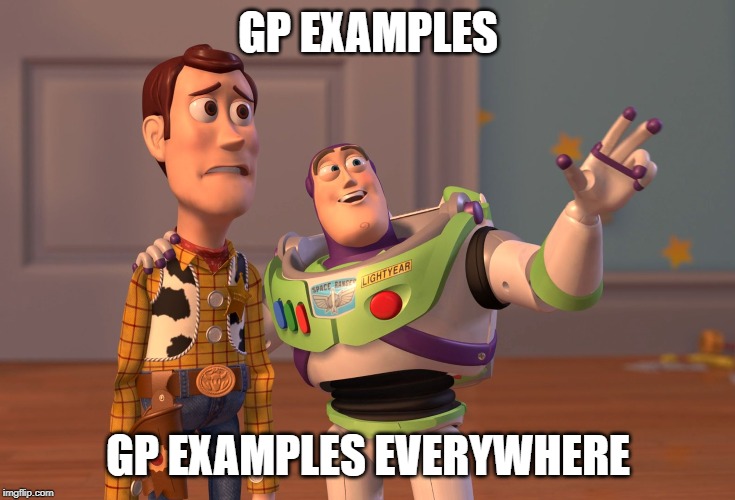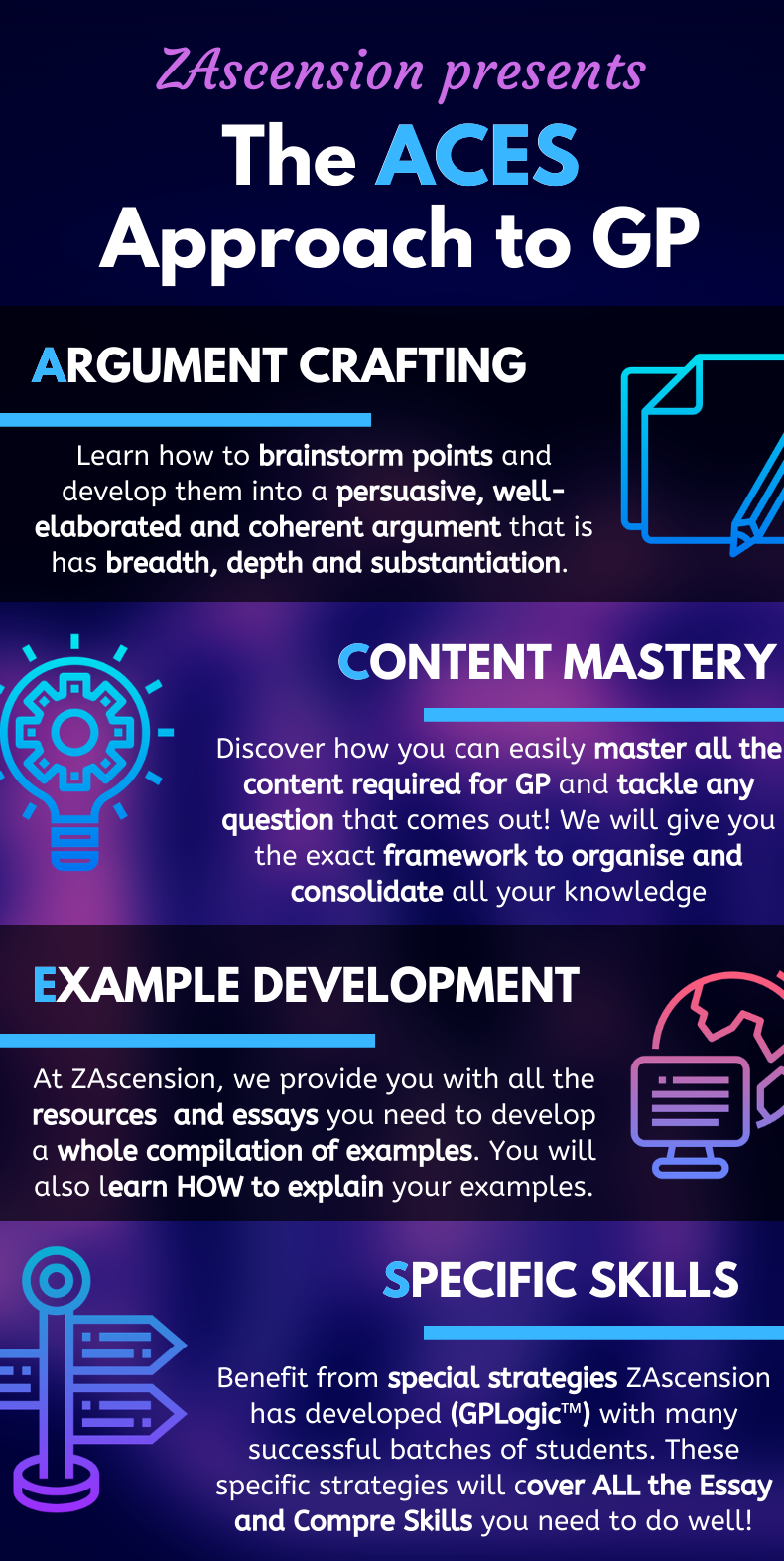GP Essay Questions from 2019 A Levels
If you want more Tips for GP, do also join this free Telegram channel which would share very helpful Tips, FAQs, and update you when articles are updated/posted 

Looking for the 2021 A Levels Essay Questions? It’s over here!
1) How far should countries have relations with others whose human rights record is poor?
2) To what extent should income equality be a goal in your society?
3) Science is the only answer to global hunger.’ Discuss.
4) Consider the view that social media has more influence than politicians.
5) To what extent is artificial intelligence replacing the role of humans?
6) ‘A leader’s responsibility should always be to his or her own country, not other nations.’ Discuss.
7) Religion is an important part of the lives of young people today.’ Consider whether this is true in your society.
8) Does violence in the visual media portray reality or encourage the unacceptable?
9) Is globalisation to be welcomed or feared today?
10) Should both parents take equal responsibility for raising their children?
11) Assess the importance of food within Singaporean culture.
12) Can fiction teach us anything meaningful about the real world?
General Comments:
To be honest, this year’s questions are pretty awesome because many of the questions have easy examples that we can use to address them. Even for those questions that seem very niche or complex because they involve more than one topic, you can still fall back to your existing content knowledge. As i mentioned in my previous article, the major topics for GP include: Arts, Science, Media, Environment, Politics. For 2019, we have 2 questions on Science (qns 3 and 5) with AI being the really obvious one that we know was bound to come out eventually. We have 2 questions on media (qns 4 and 8) – qn 4 is slightly harder but it is at its core asking about the power of social media in influencing socio-political issues; qn 8 is an easy one because how broad it is (focusing on visual media instead of just one medium like television or video games). We have no question on environment (which is not unexpected because environment tends to come and go, it doesn’t come out every year, which also means next year it is highly likely to reappear again). We have 3 questions on politics (qns 1, 6 and 9). Qn 1 touches on international relations and human rights, qn 6 looks at the tension between domestic affairs and intervention in outside affairs, qn 9 is just about globalisation. With the exception of question 1, qns 6 and 9 are very standard topics for politics. For Arts, it seems like there isn’t any question but you need to realise that qn 12 is essentially an arts question because fiction is very much found in the arts (books, films, stories found in paintings or music or plays etc) and qn 12 is my personal favourite because of how fun it is to write it and how easy it is to think of examples!
The point here is that it really pays to study for major topics in GP. GP is not exactly just about random knowledge about the world. There is indeed a way you can master content for GP and targeting some of these major topics is a good way to go about it. This was also the reason why i wanted to stress some of the must-read questions in my previous article! In fact, i predicted 4, 5, 6 and 12. So the point is, key issues are often pretty standard in GP and content isn’t that hard to master afterall
If you want more Tips for GP, do also join this free Telegram channel which would share very helpful Tips, FAQs, and update you when articles are updated/posted 
Specific Analysis:
1) How far should countries have relations with others whose human rights record is poor?
- Notice that the common trend in A Levels Questions these days is to include a very specific context/framing in the question. In this case, we are looking very closely at international relations but that between the more normal countries and those with despotic regimes and poor human rights. One of the key topics from Politics is international relations and also how countries should interact with one another (diplomacy or deterrence etc). But this question is an interesting specific one that dives into human rights specifically.
- The good news is that the examples you can use in your essays should relate to very major events that we all know about (countries with deplorable human rights record and all those violations) – Iraq and Syria with their chemical weapons against civilians, China and Myanmar with how they treat ethnic minorities or political dissidents, Saudi and Turkey with censorship and massive crackdown on activists, Venezeula with its hyperinflation and widespread food shortage, Yemen and again Syria, with their armed conflict and huge displacements of refugees.
- Learning point here is that you don’t have to panic when you see an unfamiliar question! Think about how you can leverage on content knowledge you already have to connect with this seemingly new question! There are so many examples which makes this question easy to address.
- All you have to do is think about how other countries are interacting with these countries currently. There is a strong moral impetus to of course criticise these countries or cut off friendly relations with them in order to exert pressure for change. However, with interests involved, these human rights records are often overlooked until there is a major violation that sparks international outcry. But remember, the question is SHOULD countries have relations, so it is up to you to argue.
2) To what extent should income equality be a goal in your society?
- The key argument word in this question is “goal”. So you should not be discussing whether or not income inequality currently exists; you should focus on whether we should be aiming for equality.
- Singapore does have an unfavourable ranking for income inequality. In 2018, according to the Commitment to Reducing Inequality Index (CRI), Singapore ranks among the bottom 10 countries. So this points at perhaps existing lack of efforts or the severity of the income disparity, which then calls for ameliorating it to be a goal.
- Of course that being said, we must also remember that in Singapore the general standard of living is high and we don’t have many individuals living in dire conditions (homeless rates are way higher in many other countries). There are also many subsidies provided for housing, healthcare and stuff like GST vouchers to try and improve the lives of those who are less privileged.
- This question also focuses on extent, so you can think about what a realistic goal is and whether or not income equality (the idea of equality means eradicating all inequality) is indeed something we should be aiming for, or could there be some middle-ground? Remember that for extent questions, you have to pinpoint what exactly this extent is!
3) Science is the only answer to global hunger.’ Discuss.
- Another trend of recent A Levels question is also to combine two topics in one question. This question combines Science and Food Security, which can prove difficult for many students who focus on Science & Tech but have no specialised knowledge about global hunger. I would usually recommend that such questions should be avoided unless you have knowledge in both spheres because it would be hard to fully address the question requirements if you are lacking knowledge in either.
- Take note that the question has the word ‘only’, which is an absolute. When it comes to absolute it is often easier to disagree because you just need one good alternative to global hunger and that would skew the question towards the disagree side. And one alternative that comes to mind would obviously be politics. There has already been a lot of technology aimed at solving hunger issues or increasing food supply, but the issue is often how corrupt governments siphon off food supplies and they never reach the mass population.
- Instead of there being a lack of food in the world, it is probably the inadequate channels that are not delivering food to those who need it. Science always seems to be the solution but sometimes there are underlying root causes that we have to remember. However, it is certainly true that science offers tremendous possibilities in increasing our agriculture yield and food distribution capabilities.
- My advice is if you are studying for the major topics, you can also pay some attention to the odd questions that combine two topics together because you never know which can come out for the A Levels! Don’t stay too comfortable with the usual questions!
4) Consider the view that social media has more influence than politicians.
- Just like the previous question, this also combines two topics together: media and politics. Your task for this question is to basically look into political and social issues and then compare the impact that social media and politicians have on them.
- A useful way to think about this is to consider the stakeholders involved on social media other than politicians themselves. Social media has often been cited as a huge leveler that empowers the common man because it provides voice and influence. Individuals can go online to express their sentiments about an issue and start gaining a following. Think about how the Arab Spring has its roots in social media, or all the social media sentiments surrounding the Hong Kong protests currently, or how social campagins like BlackLivesMatter and the MeToo movement have gained huge traction to channel these issues into the public consciousness (so much that politicians are forced to discuss these issues).
- I also have another local example that i remember. In the Monica Baey sexual harassment incident in 2019, the discussion that went viral online also engendered a corollary parliamentary discussion about sexual misconduct in schools. Clearly, social media does have some serious influence over politics and politicians.
- The other side of the argument could point at how politicians themselves use social media as a tool to extend their influence. If you can show politicians are the ones in control, wielding social media as a tool, then it will mean they have more influence.
- Again, this may seem like a really hard question at first but honestly it is quite manageable because the examples are very typical examples that we would raise when we are talking about the pros and cons of social media! I can’t stress enough how it is extremely important to not panic during the exams, and instead think carefully how the question can relate to content you have prepared!
5) To what extent is artificial intelligence replacing the role of humans?
- Ah, the question that i have predicted and many schools also had this in their prelims for 2019. This was the question that was just waiting to appear ever since 2017. I always knew it was going to come out simply because of how prominent AI is. The learning point here is really how we have to pay attention to the most recent developments because they will become key issues for a topic. For instance, i was also predicting fake news for media. It has not come out this year but it certainly might in 2020 or 2021 simply because of how significant it is.
- When it comes to AI, there is just 1 main question that we want to answer – is it good or is it bad? In other words, should we embrace it or be wary of it? Some of the major concerns always point to how it could replace human beings and displace jobs, but others point out how it is merely a tool despite it being ground-breaking and revolutionary (like the internet has been in its inception).
- At this point, i want to point out that there is a difference between the question asking ‘is it replacing the role of humans’ vs ‘SHOULD it replace the role of humans’. The latter is more about whether we should allow AI to do s0 (in terms of the ethical and pragmatic concerns) whereas the former looks at whether it is currently happening (without us really making a choice; it is about what is organically occurring right now).
- Some key arguments would be to say it is replacing because of its unprecedented capabilities and how it can perform tasks with more precision, speed and essentially take over either really dangerous jobs or really menial repetitive tasks. It can also make more rational choices based on hard evidence in their data bases because of the large amount of memory they can store and the algorithms that would help it make predictions that are not susceptible to human error. Examples includes new AI medical programmes, Project Artemis. Foxconn replacing manufacturing plant workers with robots, Amazon’s drones etc.
- The other side would look at reliability and safety issues surrounding AI such that it can not be fully independent without the supervision of humans, and also how humans merely adapt and develop new roles instead of being replaced. Another strong arugment you can made against it would be how human values are extremely valuable and precisely what we need in society that is irreplaceable by AI, stuff like empathy or creativity. Remember that AI is ultimately a programme designed by human beings so human beings still have to be at the forefront of setting guidelines and providing new developmental directions.
- Basically there are plenty of arguments on both sides and essays that do well are those that can properly explain these arguments rather than make sweeping statements, and provide really concrete examples that help illustrate these points.
6) ‘A leader’s responsibility should always be to his or her own country, not other nations.’ Discuss.
- This is another question that i predicted in my previous article. I discussed : In today’s world, governments should prioritise domestic affairs over international ones.’ Discuss.” You can see the obvious similarities between both question because they are both asking whether a leader should focus on his own country or intervene in affairs of others. The difference is that this A Level question is an absolute, so again for questions with absolute i would encourage you to disagree because there are bound to be situations where a leader should be responsible to other nations.
- Like i mentioned, this is a very important question for politics. There is always this tension between focusing on domestic affairs and interfering in other affairs concerning other countries. From a government’s perspective, they were elected by the people and have an obvious responsibility to them to fulfill this social contract. Their main responsibility would be to ensure the welfare of their citizens, the growth of the economy, the safety and social cohesion of the country etc.
- However, we need to remember that the lines are often not so blurred. International issues often have spillover effects on countries. For example, the problems with conflicts and wars and how they lead to refugee and migration issues, or global issues like environmental and energy conservation transcends the boundaries of countries to affect everyone. Terrorism is also another good example of how it can easily take root in any country with extremist ideas, rather than being something confined to a geographical area. To ignore other nations’ issues would be problematic because these issues could come back to haunt the country. And from a less pragmatic view, there are universal human rights. For humanitarian crisis that happen with people dying and suffering in other countries, it could be difficult and even heartless to insist that the leader is just solely responsible for domestic affairs. Imagine this situation where there is a human rights violation in other countries (kinda like in qn 1), would you then ask the government to completely wash their hands off and watch the countless of lives lost? This was the scenario depicted in the TV series, Designated Survivors, but very much a real situation too.
7) Religion is an important part of the lives of young people today.’ Consider whether this is true in your society.
- This is a unique question that is pretty refreshing, i don’t recall a local question about religion and certainly not one that focuses on youths. The good thing about this question is that it is extremely straightforward, there is nothing that you have to pay special attention to. If you remember, modifiers in the question can include: Extent, Absolutes, Context, Comparison. In this case, there is nothing except the Singapore part. All you need to do is define important.
- Important could mean several things: whether is has a key function in their lives, or whether it is providing some kind of indispensable value that could only be derived from religion, whether it is something that is deeply meaningful to them and shapes their lives etc. Notice how we are not just giving synonyms like ‘vital’ or ‘significant’. Synonyms alone are not helpful, when you define keywords you need to remember to pinpoint exactly what it would look like, and in the context of the topic — religion in this case!
- Some arguments include providing direction for youths, giving them a sense of purpose in life, inculcating the right values in them, connecting them to a larger community etc. Counter-arguments could talk about how in the first place, there are also many young people who are non-believers and would derive all these benefits from something other than religion, or that there are cases where young people might experience some conflict between their religious teachings and values found in the modern world; this disconnect could then diminish the importance of religion because it seems incompatible with their lives.
8) Does violence in the visual media portray reality or encourage the unacceptable?
- This question is like a throwback to older media questions (before 2010) about whether the television is promoting violence or simply just reflecting the real world. Of course, the question has adapted to modern times to talk about visual media which is awesome because it means you can draw examples from any visual media like films, games, online videos, television programmes, music videos, news live reporting etc. In fact the key to doing well for this question would be the scope of examples, the larger range of examples you can provide, the better you can score.
- The dichotomy here is pretty clear, it is simply asking whether visual media encourages violence or is it just objectively showing it. Both sides of the arguments are quite significant. On one hand, we can think of so much content that uses violence as a way to sensationalise and grab attention (think about some of the movies like Saw, Final Destination or John Wick, or games like Dead by Daylight and Resident Evil). Violence no doubt has its appeal as content to hook the audience. Note that you have to go further and explain whether these content are encouraging the unacceptable. If they have no impact on their audience except pure entertainment that that is not considered encouraging the unacceptable. So you will need to discuss how impressionable minds might be affected by stuff they see and be galvanised to replicate that violence.
- On the other hand , you can talk about how some of these violent displays are just reflective of what is happening in the world around and if it’s just a reflection, it can’t be encouraging anything since people already know that such violence exist (it is not a new ideology being propagated). Also remember that for more matured and discerning minds, being exposed to violent content would certainly not directly translate into violent inclinations. There are some extreme cases that you can point out like how the recent Joker film was concerned with a recurring mass shooting like the one in Colorado for The Dark Knight. But for most cases, the majority is probably sensible enough to not see it as some call to action.
9) Is globalisation to be welcomed or feared today?
- Under politics, this is also a very typical question. I classify it under politics because it involves countries and stuff like migration so the content you use will be very similar to what you focus on for politics. When a question asks you either X or Y, you don’t have to be confused and say there are 2 points you need to address. You need to realise that it is ultimately one point because usually these 2 choices are dichotomous, it is either welcome or fear. I could easily rephrase the question to “should we embrace globalisation today” and that would be the same question.
- This is a classical question that i would say is easy and straightforward because it has been discussed many times before. Some fears of globalisation would be how open borders could lead to unrestricted migration which could present social prooblems, or how it could mean that jobs are being replaced by foreigners or that international companies would outplay and eradicate the local ones, or that local culture would be under threat from other international cultures.
- Pros of it could include the increased diversity because people can come together and share ideas, provide more access to different types of goods and services (think about how international brands have lowered prices for consumers especially in fashion and tech), development of local industries with the influx of foreign expertise or from forced innovation to compete against international competition etc, or culture exchange and open information and ideas flow etc.
10) Should both parents take equal responsibility for raising their children?
- This is a question that looks at gender roles and family structure. I would also say that it is quite a typical question asking whether there should fixed roles where one parent focuses on earning an income while the other stays at home and spends more time with the children to nurture and accompany their growing up years. These lines were probably pretty distinct in the past, but in modern society with female empowerment and many women actively pursuing their careers, it is no surprise that it becomes an issue with no correct or obvious answer.
- Taking equal responsibility might be necessitated by how both parents have the same work obligations and no one should be unfairly and disproportionately burdened with raising the children. Or you could also discuss how both parents have different traits and values they can offer and to claim unequal responsibility would be to effectively limit how much one parent can contribute to the development of the child. You may also look at it from a numbers point of view, having both parents take responsibility could be important because in today’s world there is so much to influence a child and so much to teach a child (thanks to technology), so it can no longer be just the concern of one parent.
- The opposing views could look at how maybe equal responsibility is hard to define and feels somewhat forced and inorganic, so it could instead be left up to a parent’s own discretion based on their career circumstances or their other obligations. Or another way to look at it could be how instead of equal responsibility, they have different responsibilities. For instance, one parent could focus more on discipline while the other focuses on increasing the child’s exposure etc, the logic is that each parent has their own expertise to impart.
11) Assess the importance of food within Singaporean culture.
- This is a fun question to talk about and i would say extremely easy if you didn’t have any specialised knowledge going into the exams. Food is something so relatable for us Singaporeans and you can draw examples from everything you see around you. However, the key to scoring in this essay is to discuss different aspects of this importance rather than just spam examples of food.
- Food is an obvious representation of the many distinct and unique cultures that exist in Singapore and food is a manifestation of these cultures (think Peranakan for example), food ensures that these cultures continue to live on in modern society. Food can also be a huge point of national identity because we are very proud to associate Singapore with the local delights (Laksa, Chicken Rice, Char Kway Teow etc). It has become a part of our national consciousness. You can also expand the discussion by not just looking at food but rather places that involve food. For example, food is often a powerful reason for social gatherings and bringing people together and this sense of closeness simply cannot be replicated without food acting as a medium to connect people. So food becomes an important tool for social cohesion and community-building. Food is also like a trend that unites Singaporeans, because Singaporeans would be so excited queuing for the latest food sensations (Tiger Sugar, Cheese Toast); this excitement is pretty much a Singaporean thing. Notice that you have to constantly link back to the Singapore culture because that is the crux of the question.
- I feel that for this question it is much much much easier to have the stand towards importance because it seems pretty obvious that food matters a lot to Singaporeans. If i were to write the counter-argument, i would just mention about how we don’t pay special attention to food because it is so cheap and so ordinary, and so it may not have much impact on people. When you eat something delicious, do you really think about the culture behind it? Most of the times, we probably don’t and we just eat it for the taste without bother for its significance.
12) Can fiction teach us anything meaningful about the real world?
- My favorite question of all. I would totally have done this question if i were taking the A Levels this year. In 2014, a real similar question came out: “Do films offer anything more than an escape from reality?”. Both questions are talking about whether the subject (film/fiction) offers a value that goes beyond just creating a fictitious world for viewers — does it have any real value for viewers? Also, take note that films and fiction are incredibly connected because many films are based on fictitious storylines.
- The easy way to answer this question is to think about all the important impacts that fiction has. Stories often exist for bigger reasons, they are not just to create some random fake world without any meaning. Fiction exists to get the audience to think about many different things. For instance with regard to mitigating social issues and creating change, X-men universe is ultimately an incisive look into the problem of discrimination, or stuff like Uncle Tom’s Cabin and To Kill a Mockingbird are both using fiction to try and reflect the very real African American struggle for civil rights. Stuff like “1984” and “Brave New World” are also cautionary tales about the horrors of technology and such reminders are useful pauses for us to evaluate our incessant chase for advancement. You can also talk about how cartoons like Spirited Away or Inside Out have important lessons that they wish to convey, and important themes that are extremely pertinent to the world we are living in. Spirited Away looks at the importance of childhood, the value of independence and tenacity while Inside Out reveals a lot of deep insights about how we should deal with our emotions, finding cathartic outlets instead of suppressing them etc. Basically, the idea is that fiction is a conduit in which creators of it use to convey something much deeper. Why fiction? Because it can circumvent censorship for potentially sensitive issues, and it can also use the power of poignant stories to resonate with readers and engender very visceral reactions which help change perspectives.
- The beauty of this question is that you can find so many examples from all around you because fiction exists everywhere. All you have to do is ask yourself why the creator of that particular work has put in all the effort to create this world and you will get many arguments for this question. The counter-argument can be one talking about how critics point out that fiction is very removed from reality and simply provides a frivolous escapism. I absolutely love this type of question because there is incredible room for personal voice! Check out my actual A-grade essay for A Levels to see how i have written the films one!
If you found this helpful, do check out our new GP Tips & Resources Telegram Channel! Click here to join. This channel is meant to act as a GP companion to share knowledge and help all students, regardless of whether they are a part of ZAscension. Everyday there will be Tips of the Day, Answers to FAQs, Articles and many more. So if you enjoyed this article, this channel will definitely be useful for you
Do share this article and also the Telegram channel with everyone you know who is also studying for GP, let’s share the good stuff so that we may all learn





